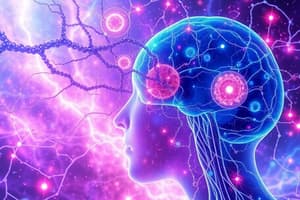Podcast
Questions and Answers
What happens to PFC activity when individuals experience serotonin loss while viewing furious faces?
What happens to PFC activity when individuals experience serotonin loss while viewing furious faces?
- PFC activity decreases. (correct)
- PFC activity increases significantly.
- PFC activity remains unchanged.
- PFC activity fluctuates unpredictably.
How does serotonin impact the connection between the PFC and the amygdala?
How does serotonin impact the connection between the PFC and the amygdala?
- It has no effect on their connection.
- It modifies the connection without disruption.
- It strengthens the connection.
- It disrupts the connection. (correct)
What is a potential outcome of disrupted PFC and amygdala regulation due to low serotonin?
What is a potential outcome of disrupted PFC and amygdala regulation due to low serotonin?
- Decreased impulsive behavior.
- Increased aggression and impulsive conduct. (correct)
- Enhanced social interactions.
- Increased emotional regulation.
What limitation does the study suffer from regarding its participant selection?
What limitation does the study suffer from regarding its participant selection?
What does the study suggest about the importance of serotonin in emotional regulation?
What does the study suggest about the importance of serotonin in emotional regulation?
What is the primary role of serotonin in the brain?
What is the primary role of serotonin in the brain?
Which brain regions are linked by serotonin in terms of emotional regulation?
Which brain regions are linked by serotonin in terms of emotional regulation?
According to research, what happens when serotonin levels fall?
According to research, what happens when serotonin levels fall?
What method did Passamonti et al. (2011) use to investigate serotonin's effects?
What method did Passamonti et al. (2011) use to investigate serotonin's effects?
How does serotonin facilitate emotional equilibrium between the PFC and the amygdala?
How does serotonin facilitate emotional equilibrium between the PFC and the amygdala?
What characteristic of the amygdala is particularly important in the context of serotonin's function?
What characteristic of the amygdala is particularly important in the context of serotonin's function?
What was the primary focus of Raine et al. (1997) in their research?
What was the primary focus of Raine et al. (1997) in their research?
In the study by Passamonti et al. (2011), what was administered to participants to reduce serotonin levels?
In the study by Passamonti et al. (2011), what was administered to participants to reduce serotonin levels?
What brain regions are primarily affected in the murder suspects according to the study?
What brain regions are primarily affected in the murder suspects according to the study?
How does decreased activity in the prefrontal cortex (PFC) affect behavior?
How does decreased activity in the prefrontal cortex (PFC) affect behavior?
Which neurotransmitter is indicated as significant for regulating behavioral and emotional responses?
Which neurotransmitter is indicated as significant for regulating behavioral and emotional responses?
What is a significant limitation of the study's findings?
What is a significant limitation of the study's findings?
What might be a reason for the brain abnormalities observed in the murder suspects?
What might be a reason for the brain abnormalities observed in the murder suspects?
What is one of the main purposes of using PET scans in the study?
What is one of the main purposes of using PET scans in the study?
What type of crimes did the individuals in the study commit?
What type of crimes did the individuals in the study commit?
What aspect of brain function is primarily investigated in relation to impulse regulation?
What aspect of brain function is primarily investigated in relation to impulse regulation?
Flashcards
Serotonin's Role
Serotonin's Role
Serotonin is crucial for the prefrontal cortex (PFC) to regulate the amygdala's emotional responses, particularly when dealing with negative emotions or social threats.
Low Serotonin Effect
Low Serotonin Effect
Lower serotonin levels disrupt the connection between the PFC and the amygdala, making it harder for the PFC to control emotional reactions.
PFC Activity Decrease
PFC Activity Decrease
When exposed to angry faces, individuals with low serotonin levels show reduced activity in the PFC.
Emotional Impact
Emotional Impact
Signup and view all the flashcards
Study Limitations
Study Limitations
Signup and view all the flashcards
Neurotransmitters
Neurotransmitters
Signup and view all the flashcards
Serotonin
Serotonin
Signup and view all the flashcards
Prefrontal Cortex (PFC)
Prefrontal Cortex (PFC)
Signup and view all the flashcards
Amygdala
Amygdala
Signup and view all the flashcards
PFC-Amygdala Connection
PFC-Amygdala Connection
Signup and view all the flashcards
Low Serotonin
Low Serotonin
Signup and view all the flashcards
Passamonti et al. (2011)
Passamonti et al. (2011)
Signup and view all the flashcards
Tryptophan Depletion
Tryptophan Depletion
Signup and view all the flashcards
Limbic System
Limbic System
Signup and view all the flashcards
PET Scan
PET Scan
Signup and view all the flashcards
Reduced PFC Activity
Reduced PFC Activity
Signup and view all the flashcards
Limbic System Abnormalities
Limbic System Abnormalities
Signup and view all the flashcards
Aggressive Behavior
Aggressive Behavior
Signup and view all the flashcards
Brain Variations and Aggression
Brain Variations and Aggression
Signup and view all the flashcards
Study Notes
Neurotransmission and Behavior
- Neurotransmitters facilitate communication between neurons, regulating behavior and mental processes.
- Serotonin is crucial for controlling emotions, anger, and impulse control.
- Serotonin enables the prefrontal cortex (PFC) to control the amygdala's emotional reactions, maintaining emotional equilibrium.
- Low serotonin levels can link to aggressive behavior, impulsivity, and emotional outbursts.
- This imbalance is more significant in dangerous situations, where the amygdala might dominate lacking PFC control.
- Studies demonstrate a connection between low serotonin levels and elevated impulsivity and aggression.
Passamonti et al. (2011) Study
- Examined serotonin's effect on brain activity, focusing on PFC-amygdala interactions during emotional processing.
- Used a randomized, repeated-measures design with 30 healthy volunteers.
- Participants consumed a beverage with reduced serotonin or a placebo.
- fMRI scans monitored brain activity while participants viewed neutral, angry, and sad faces.
- Findings showed reduced PFC activity with decreased serotonin levels during exposure to angry faces.
- Also demonstrated a disrupted connection between the PFC and amygdala with lowered serotonin.
- Concluded that serotonin is critical for the PFC's ability to control the amygdala's emotional responses, particularly during negative emotional stimulation/social threats.
- Limitations included indirectly measuring serotonin, healthy participant group not reflective of all demographics.
Raine et al. (1997) Study
- Compared brain activity of murderers to a control group.
- Used PET scans to identify abnormalities.
- Found reduced activity in the PFC and increased activity in the limbic system (amygdala, thalamus).
- Suggested a potential connection between brain abnormalities and aggression/violent behavior.
- Limitations included severe criminal behavior in the sample, potentially not generalizable to broader populations.
General Points
- Both studies highlight the importance of serotonin in emotional regulation and behavioral control.
- Interplay between biological and environmental influences on behavior is complex.
- More research is needed to fully understand the role of serotonin and other neurotransmitters in various demographics.
- Ethical considerations limit the experimentation that can be conducted in the field of mental health research.
Studying That Suits You
Use AI to generate personalized quizzes and flashcards to suit your learning preferences.




